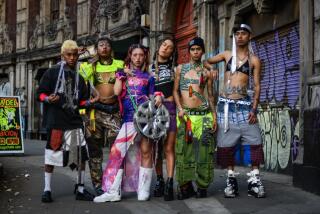Demolition Construction
Chris Dye, lead singer of the Dashboard Prophets, likes to wear alternative clothing that reflects his music--fashion that rocks the status quo.
In short, he’s not a Dockers pants man.
When he’s on stage, he sometimes wears clothes by Demolition Gear, a Westminster-based company whose unconventional fashions have drawn a loyal following in the music industry. Dye wears Demolition Gear’s hipster pants and T-shirts, while other band members wear the line’s oversized shorts with exposed zippers.
Demolition Gear “pushes the boundaries,” Dye says. “Their clothing has that alternative edge to it that’s in contact with the music. It all ties into the subculture.”
That Demolition Gear isn’t a mainstream clothing company is obvious by the name of its T-shirt line, Pukewear, as well as its anarchy symbol logo--a circle with the letter A--that some mistake for a satanic pentagram.
“Parents hate us, but that’s the best part,” says Scott Rickett, the company’s sales director.
Demolition Gear appeals to those who don’t want to dress like everybody else--and who more than a rock musician wants clothes that are different?
Go-Gos’ guitarist Jane Wiedlin, who now has her own band called Frosted, likes to wear Demolition Gear’s “cuddly, soft cord jacket” ($80) and Pukewear T-shirts, especially those emblazoned with the names of seminal punk bands such as the Clash.
“It’s a combination of the stuff I liked in 1978 combined with an updated ‘90s look,” Wiedlin says. Her Frosted bandmates wear Demolition Gear’s zip-front shorts (about $45) in bull denim in stripes or solids.
Music and fashion have long influenced each other. Superstar Madonna on down to members of obscure garage bands look to fashion designers to help define their image, while fans copy their every look. Fashion designers also are inspired by the music and the musicians’ style.
Demolition Gear has gained the respect of musicians in part because those who run the company have long been involved in music themselves. All three partners, Kimm Gardener and his wife, Kelli, of Long Beach and Kelli’s brother Gary Adams of Anaheim, play or sing. Kimm Gardener plays guitar for the local punk band CH3, and the only other full-time employee, Rickett of Laguna Hills, plays guitar for Lucian, a Los Angeles band.
“They have a real musical edge to their clothing,” Dye says. “They’re big fans of music, and [it] comes across.”
Demolition Gear operates much like a punk garage band. The partners work out of a renovated warehouse that they have filled with a leopard print sofa and other funky furnishings, including a prized collection of gargoyles. There are industrial-looking displays and wire grids for showing off their latest clothes.
Costs range from $15 for T-shirts to $80 for jackets, with most shorts, shirts and pants selling for $30 to $50.
Clothing design is a group effort, with the four thirtysomethings contributing ideas for new styles. No single designer rules.
“We all have a do-it-yourself attitude like bands that played in their garages and sent their tapes to record companies,” Kimm Gardener says. “We’re all creative and have an eye for things we like to wear.”
For the men’s line, the group has created denim pants and shorts with zipper fronts in all kinds of fabrics, including a wide circus stripe. They’ve also designed Greg Brady striped knit T-shirts; vintage-style bowling shirts come in yarn-dyed plaids and stretch polyester, including a wild leopard print. A zip-up turtleneck can be worn front- or back-facing. They call their reversible unisex turtleneck ($30) the Link because it looks like something out of “The Mod Squad.” It comes in tie-dyed velvet, striped and solid knit cottons.
“We’re just trying to do something different,” Adams says.
*
Demolition Girl, the women’s line, features hipster pants in tie-dyed or solid penne velvets ($30) and halters ($24). Mandarin-collar sleeveless tops ($36) come in black and white striped stretch knit and penne velvets in black, brown and burgundy. Marcia Brady zip-front dresses ($39) come in the penne velvet brown, black or wine and the leopard or stripe knit. Marcia Brady tops ($28) are made of a cotton knit in an array of solid hues as well as a fun leopard print and stripes.
Pukewear tees pay homage to classic punk bands such as the Jam, the Sex Pistols and the Clash. Fans of new punk bands such as Berkeley-based Rancid like the punk shirts, Gardener says.
Adams started Demolition Gear out of his home in Orange in January 1994. He worked setting up booths at trade shows for other clothing companies before starting his own fashion business.
He got the idea for Demolition Gear’s anarchy insignia when he noticed a friend and former partner had the circle A symbol for anarchy tattooed on his arm.
“I immediately asked him, ‘Has anyone trade-marked that?’ ” Adams says.
No one had, so Adams did.
Unlike many local clothing companies, which start out making T-shirts before progressing to more complicated clothing, Demolition Gear began making shorts and other cut-and-sew clothes and later added T-shirts. The company outgrew Adams’ house a year ago.
“There’d be bolts of fabric in the living room,” Gardener says. Even the kitchen was being taken over, so in April, Demolition Gear moved to the warehouse in Westminster. The clothes are manufactured off-site by independent contractors.
Demolition Gear sells to about 400 stores in the United States and overseas. The company also distributes a line of magnetic jewelry so people can wear nose rings and lip studs without piercing.
Demolition Gear’s target market is the counterculture--the company’s customers don’t shop at department stores. The clothing line is carried primarily at “little funky stores,” says Gardener, such as Zac Attac in Huntington Beach and Nothing Shocking in Fullerton that cater to wearers of alternative clothing.
“Our target customers want to be different, but they’re not quite ready for rubber,” Kelli Gardener says.
To stay in touch with their market, the partners spend time talking to kids who cruise by their warehouse and peek in the window--lured by the large anarchy symbol out front--or who stop by their booths at trade shows or music festivals. The kids usually walk away with Demolition Gear stickers.
“I saw one kid with an ‘anarchy’ sticker on his roller-blades,” Kimm Gardener says.
Contrary to their anarchy logo and mottoes such as “Stay Sick,” Demolition Gear’s owners say they’re not bent on destruction--only nonconformity and self-expression.
“We tout the individual liberty part of anarchy,” Adams says.
More to Read
The biggest entertainment stories
Get our big stories about Hollywood, film, television, music, arts, culture and more right in your inbox as soon as they publish.
You may occasionally receive promotional content from the Los Angeles Times.










